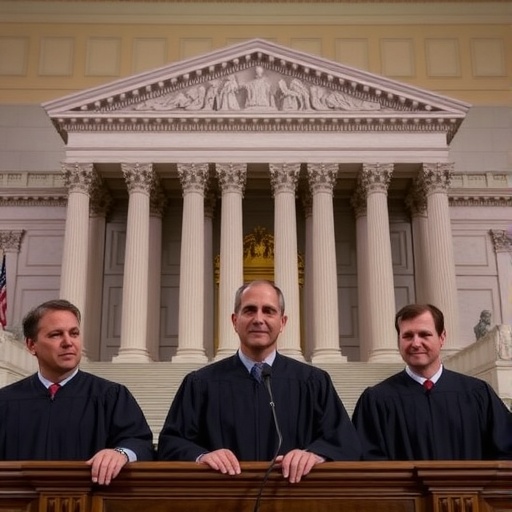Pennsylvania Supreme Court Retention Elections: Three Democrat Justices Face Pivotal Vote That Could Reshape Voting Rights and Political Balance
In a high-stakes battle that could redefine Pennsylvania‘s judicial landscape, three Democrat-leaning justices on the state’s Supreme Court are up for retention elections this November, with their fates hanging in the balance amid intense partisan scrutiny. As Pennsylvania remains a battleground state in national politics, the outcome of these retention votes could tip the court’s ideological scales, directly influencing landmark decisions on voting rights, reproductive freedoms, and beyond.
- Spotlight on the Justices: Records That Defined Pennsylvania’s Legal Frontier
- Voting Rights Under the Microscope: Pennsylvania Supreme Court’s Pivotal Rulings
- Reproductive Rights and Redistricting: Broader Stakes in the Retention Battle
- Mobilizing the Vote: Campaigns and Voter Sentiment in Pennsylvania’s Heartland
The Pennsylvania Supreme Court, a powerhouse in shaping state policy, currently holds a 5-2 Democratic majority. However, the retention elections for Justices Christine Donohue, David Wecht, and Kevin Dougherty— all elected with strong Democratic support—represent a rare vulnerability. Retention elections, unique to Pennsylvania among major states, allow voters to decide whether sitting justices stay on the bench for another 10-year term with a simple yes-or-no ballot question. A ‘no’ vote from just over 50% of participants could oust them, potentially handing Republicans a path to control and altering rulings on critical issues like election integrity.
With the November 5 general election approaching, political activists on both sides are ramping up campaigns. Democrats warn that losing these seats could dismantle protections for voting rights in a state where close margins decided the 2020 presidential race. Republicans, meanwhile, argue the justices have overreached, citing decisions that expanded mail-in voting and struck down GOP-drawn congressional maps. Polls from early September show tight races, with retention support hovering around 55-60% for each justice, per a Franklin & Marshall College survey, but turnout among independents could swing the results.
Spotlight on the Justices: Records That Defined Pennsylvania’s Legal Frontier
Justice Christine Donohue, who joined the court in 2016 after a career as a Superior Court judge, has been a vocal advocate for equitable access to justice. Her tenure includes authoring the majority opinion in a 2021 case that invalidated Republican efforts to impose stricter voter ID requirements, a decision hailed by civil rights groups as a bulwark against disenfranchisement. ‘Pennsylvania’s democracy thrives when every eligible voter can participate without undue barriers,’ Donohue stated in a recent interview with the Pennsylvania Bar Association. Critics, including GOP lawmakers, accuse her of judicial activism, pointing to her role in expanding absentee ballot deadlines during the COVID-19 pandemic.
David Wecht, elected in 2015 and a former law professor at Duquesne University, brings a scholarly depth to the bench. Known for his dissents in criminal justice reform cases, Wecht has pushed for reevaluating mandatory minimum sentences, influencing state policies on incarceration. In the realm of voting rights, he co-authored a 2018 ruling that protected ballot access for overseas military personnel, earning bipartisan praise. Yet, his sharp critiques of conservative justices have fueled partisan attacks; a recent ad from a Republican PAC labels him ‘out of touch with everyday Pennsylvanians,’ referencing his urban Philadelphia roots.
Justice Kevin Dougherty, the court’s only sitting justice with family ties to organized labor—his brother John is a Teamsters leader— ascended in 2015 from the Superior Court. Dougherty’s opinions often align with pro-worker stances, including a 2022 decision upholding union rights in public sector disputes. On voting rights, he supported the court’s 2022 intervention in redistricting, which preserved Democratic-leaning maps and was affirmed by the U.S. Supreme Court. Opponents highlight ethical concerns from his pre-bench days, though investigations cleared him, using these to question his impartiality in a retention election year.
These justices’ combined influence has steered Pennsylvania through turbulent times, from the 2018 gerrymandering strike-down that fairer congressional districts to recent rulings on abortion access post-Dobbs. With over 200 opinions authored collectively since 2016, their records underscore a progressive tilt, making their retention a flashpoint for Democrats defending the court’s current balance.
Voting Rights Under the Microscope: Pennsylvania Supreme Court’s Pivotal Rulings
Pennsylvania’s voting rights framework has been repeatedly tested in the Supreme Court, where these three justices have cast decisive votes. In 2020, amid the pandemic, the court extended the deadline for mail-in ballots by three days, a move that allowed thousands of votes to be counted and contributed to Joe Biden’s narrow 80,000-vote victory in the state. According to the Brennan Center for Justice, this decision prevented potential disenfranchisement of up to 10% of mail-in voters, many in urban Democratic strongholds like Philadelphia and Pittsburgh.
More recently, in February 2024, the court rejected a Republican challenge to Act 77, Pennsylvania’s expansive mail-in voting law enacted in 2019. Justices Donohue, Wecht, and Dougherty formed part of the majority, arguing that overturning the law would sow chaos for the 2024 elections. ‘Stability in our electoral process is paramount,’ Wecht wrote in the opinion, emphasizing that 2.5 million Pennsylvanians voted by mail in 2022 alone. GOP leaders, including State Senate President Pro Tempore Kim Ward, decried the ruling as ‘partisan meddling,’ vowing legislative fixes if the court’s makeup shifts.
Statistics paint a stark picture: Pennsylvania saw a 20% increase in voter turnout from 2016 to 2020, partly due to court-sanctioned expansions. Yet, challenges persist; a 2023 report by the ACLU of Pennsylvania documented over 1,000 provisional ballots rejected due to technicalities, disproportionately affecting minority voters. Retention election outcomes could invite stricter rules, such as signature matching or polling place consolidations, echoing national debates in swing states like Georgia and Arizona.
Experts like Professor G. Terry Madonna from Franklin & Marshall College note, ‘The Pennsylvania Supreme Court isn’t just interpreting law; it’s safeguarding democracy in a polarized era.’ With federal courts deferring to state supreme courts on election matters, a conservative flip here could ripple nationwide, especially as 2024’s presidential contest looms.
Reproductive Rights and Redistricting: Broader Stakes in the Retention Battle
Beyond voting rights, the retention elections carry weight for reproductive freedoms in Pennsylvania, where the Supreme Court has acted as a firewall against post-Roe restrictions. In late 2022, following the U.S. Supreme Court’s Dobbs decision, Pennsylvania’s court upheld the state’s 1982 Abortion Control Act, rejecting calls for a total ban. Justices Wecht and Donohue’s opinions stressed that the state constitution’s privacy rights extend to reproductive choices, a stance that protected access amid 15 weeks of gestation limits.
Advocacy groups like Planned Parenthood Pennsylvania report that court rulings have sustained over 100 clinics statewide, serving 50,000 patients annually. ‘These justices have stood firm when federal protections crumbled,’ said Executive Director Sara John during a July rally in Harrisburg. A shift to a Republican majority could revive dormant bills, such as heartbeat bans, mirroring Ohio’s recent voter rejection of similar measures.
Redistricting remains another arena of contention. The court’s 2018 decision against GOP gerryards created more competitive districts, boosting Democratic House gains in 2018 and 2022. Data from the Princeton Gerrymandering Project shows Pennsylvania’s maps now rank among the fairest in the U.S., with a partisan bias score near zero. Dougherty’s vote was crucial in enforcing independent commissions, but Republican strategists eye retention losses as a chance to redraw lines favoring their base in rural counties.
Environmental and labor issues also hang in the balance. The court’s pro-union rulings, like a 2023 decision blocking right-to-work laws, align with Dougherty’s labor background. On climate, Donohue led a case mandating state action on fracking regulations, impacting Pennsylvania’s natural gas industry, which employs 300,000. These diverse portfolios illustrate how retention votes transcend party lines, touching everyday Pennsylvanians’ lives.
Mobilizing the Vote: Campaigns and Voter Sentiment in Pennsylvania’s Heartland
As the retention elections near, campaigns are in full swing, with Democrats outspending Republicans 3-to-1 on ads, per OpenSecrets.org data totaling $15 million. Groups like the Democratic Party of Pennsylvania launched a ‘Keep Our Court’ initiative, targeting suburban voters in Bucks and Montgomery counties through door-to-door canvassing. ‘This isn’t about partisanship; it’s about justice for all,’ emphasized Chairwoman Marisa Machado Weiner in a virtual town hall reaching 10,000 viewers.
Republican counterparts, via the Commonwealth Leaders Fund, counter with $5 million in attack ads aired on local TV, focusing on ‘judicial overreach.’ A Siena College poll from August revealed 48% of independents view the court as too liberal, up from 40% in 2020, driven by inflation and crime concerns bleeding into judicial perceptions. Voter education efforts are crucial; only 60% of Pennsylvanians understand retention elections, according to a League of Women Voters survey, prompting bilingual mailers in Latino-heavy districts.
Ground game intensifies in key areas: Philadelphia’s turnout, at 68% in 2020, could decide Donohue and Dougherty’s fates, while Wecht eyes western Pennsylvania’s steel towns. Youth mobilization via TikTok and campus drives at universities like Penn State aims to boost participation among 18-24-year-olds, who favored retention by 65% in mock polls. Historical precedent looms; in 2005, Justice Russell Nigro lost retention amid a pay scandal, shifting the court rightward for years.
National implications amplify local efforts. With Pennsylvania’s 19 electoral votes pivotal, figures like Sen. Bob Casey (D-PA) have endorsed the justices, while former President Trump rallied against them in a Butler County speech. Turnout projections estimate 5.5 million voters, a 5% dip from 2020, making every absentee ballot count.
Looking ahead, if all three justices secure retention, the Democratic majority solidifies, likely sustaining progressive precedents on voting rights and social issues through 2034. A single loss could trigger 4-3 conservative splits, inviting challenges to mail-in voting and opening doors for restrictive legislation. Conversely, full retention might embolden Democrats to codify Roe-era protections via constitutional amendments. As ballots are printed, Pennsylvania’s electorate holds the power to either preserve or pivot the state’s judicial compass, with echoes resonating to Washington and beyond.








